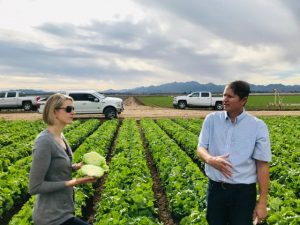By Marina DeWit, Region 9 Advocate
In the southwest corner of Arizona is Yuma County, the nation’s third largest vegetable producer. There are roughly 230,000 acres of agricultural land with rich soil, almost daily sunshine, and the Colorado River running through, giving the region perfect conditions for the nation’s longest growing season. With over 175 different crops and seeds produced in the area, many farmers seek the opportunity to invest in and grow their business.
While on a tour of the farm land with John Boelts of Desert Premium Farms, it was amazing to see the variety of crops and different stages of their growth. It is also rather impressive how much knowledge a farmer needs to possess in order to run a successful business, from knowing how to operate a huge plow tractor to choosing pelleted (covered in clay) seeds for precise crop growth.

Farming in Yuma is a communal business. With over 450 small, family-owned agricultural companies in the area, they depend on each other for the news, support, information, and collaborative effort to succeed. Most businesses employ less than 50 people and greatly rely on thousands of seasonal field workers that travel to Yuma from Mexico each year. Even though some workers have green cards entitling them to live in the United States, many chose to live more cheaply in Mexico with their families. Many workers come to the United States through the H-2A visa program, which is intended to help farmers who are experiencing labor shortage.
H-2A workers are granted temporary visas that will require them to return to their home countries after a specific time period. Farm owners are responsible for providing housing for these workers, and, if the place of living doesn’t have a kitchen, three meals a day at a set cost.
Since Yuma County is located within 25 miles of two border crossings, the local farmers hope to amend the regulation that requires them to provide housing for workers that can commute daily to and from their Mexico homes. Allowing such an exception for the agricultural businesses located in close proximity to the international border would reduce their expense of hiring seasonal workers and allow for extra resources to be allocated in other areas.
Marina DeWit serves as the Region 9 Advocate for the SBA Office of Advocacy, representing small businesses in Arizona, California, Nevada, Hawaii, and the Pacific Islands of Guam, American Samoa, Commonwealth of the Northern Mariana Islands, and Trust Territories. DeWit works with small business owners, state and local governments, and small business associations to bring the voice of Region 9 to Washington DC. She can be reached at Marina.DeWit@sba.gov.
